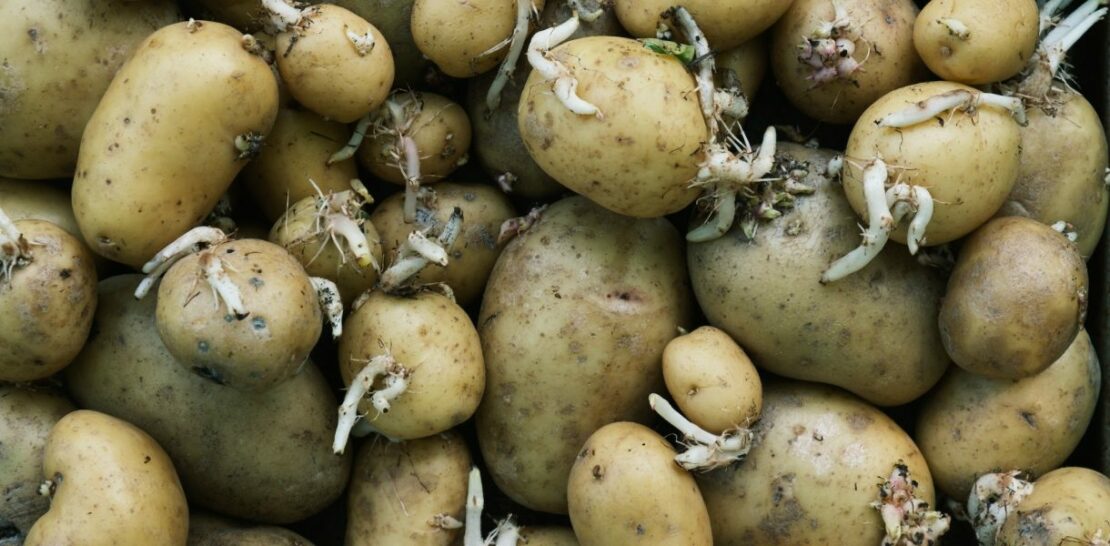Storing potatoes properly is key to preventing them from sprouting and extending their shelf life.
The good news is that there are several effective and time-tested methods to store potatoes and keep them in the best condition possible, just like your grandmother used to do.
This article will delve into the ideal storage conditions for potatoes, debunking some common myths and offering practical suggestions for storing them at home.
We’ll also reveal Grandma’s fantastic tip that has stood the test of time, ensuring that your potatoes remain fresh, firm, and sprout-free for as long as possible.
Understanding the Basics: Why Do Potatoes Sprout and How to Prevent It
Before diving into the various storage methods and techniques, it’s essential to understand why potatoes sprout in the first place and how we can prevent this from happening. Potatoes are tubers, which means that they are essentially storage organs for the plant, containing the necessary nutrients and energy for new growth. As such, sprouting is a natural process that occurs as the potato prepares to grow into a new plant.
However, in the context of human consumption, sprouting potatoes are undesirable as it leads to a loss of nutrients, a change in texture, and the development of potentially harmful compounds like solanine. To prevent sprouting, the key is to create storage conditions that are unfavorable for the growth of new plants. The main factors that influence potato sprouting are temperature, humidity, and exposure to light.
Creating the Ideal Storage Environment: The Three Pillars of Successful Potato Storage
- Temperature: Potatoes are best stored in cool and dark environments, with temperatures ranging between 45-50°F (7-10°C). Storing potatoes at lower temperatures can lead to the development of sugars, which can affect the taste and texture of the potato. On the other hand, temperatures above 50°F (10°C) can accelerate sprouting and spoilage.
- Humidity: Potatoes require a certain level of humidity to retain their moisture and freshness. Ideally, the humidity level should be around 90-95%, which can be challenging to achieve in most households. However, some practical methods can help maintain adequate humidity levels, such as placing a tray of water near the potatoes or storing them in a ventilated container with damp paper towels or newspapers.
- Light: Exposure to light can trigger sprouting in potatoes and cause the production of solanine, a toxic substance that can cause gastrointestinal issues if ingested in large quantities. To prevent this, potatoes should always be stored in dark and opaque containers or bags, away from direct sunlight and artificial light sources.
Common Storage Methods and Techniques: What Works and What Doesn’t
Now that we’ve established the ideal storage conditions for potatoes, let’s explore some common methods and techniques for storing them at home, and assess their effectiveness in preventing sprouting and spoilage.
- Storing Potatoes in a Pantry or Cupboard: One of the most common methods for storing potatoes is to simply place them in a pantry or cupboard. While this can be a viable option, it’s crucial to ensure that the storage area meets the necessary temperature, humidity, and light requirements mentioned above. It’s also important to regularly check on the potatoes and remove any that show signs of spoilage or sprouting to prevent the issue from spreading to the other potatoes.
- Storing Potatoes in a Root Cellar: Root cellars were a popular method of food storage before the advent of refrigeration and are still used today in some rural households. These underground storage spaces offer a naturally cool, dark, and humid environment, making them perfect for potato storage. If you have access to a root cellar, it’s an excellent option for keeping your potatoes fresh and sprout-free.
- Storing Potatoes in the Refrigerator: Although it might seem like a good idea, storing potatoes in the refrigerator is generally not recommended. As mentioned earlier, cold temperatures can cause the starch in potatoes to convert to sugar, resulting in an undesirable sweet taste and a change in texture. Additionally, the humidity levels in a refrigerator are often too low for potatoes, which can lead to dehydration and shriveling.
- Storing Potatoes in a Paper Bag or a Cloth Sack: Storing potatoes in a breathable container such as a paper bag or a cloth sack can help maintain the righthumidity levels and protect them from light exposure. However, it’s essential to choose a storage location with the correct temperature range, as placing the bag or sack in a warm area can still lead to sprouting and spoilage. This method can be effective if combined with proper temperature control, regular inspection, and rotation of the potatoes.
Grandma’s Fantastic Tip: How to Keep Your Potatoes Sprout-Free for Months
Now that we’ve covered the basics of potato storage and explored some common methods, it’s time to unveil the fantastic tip passed down from generation to generation – Grandma’s secret to keeping potatoes fresh and sprout-free for months. The answer lies in a simple yet highly effective technique: storing potatoes with apples.
Apples release ethylene gas, a natural plant hormone that regulates growth and ripening in fruits and vegetables. When potatoes are stored in the vicinity of apples, the ethylene gas emitted by the apples effectively inhibits sprouting and helps maintain the firmness and moisture content of the potatoes. To implement this time-tested tip, simply place an apple or two in your potato storage container, whether it’s a paper bag, a cloth sack, or a ventilated bin. Make sure to replace the apples as they ripen and consume them before they go bad, as overripe or rotten apples can have a detrimental effect on the potatoes.
In addition to harnessing the power of ethylene gas, it’s important to follow the other storage guidelines discussed earlier in this article. Ensure that your potato storage area maintains the appropriate temperature, humidity, and light conditions, and regularly inspect and rotate the potatoes to minimize the risk of spoilage.
With Grandma’s fantastic tip and a solid understanding of the principles behind proper potato storage, you can now keep your potatoes fresh, firm, and free of sprouts for extended periods. Say goodbye to the disappointment of discovering a bag of sprouted and inedible potatoes, and embrace the satisfaction of having a ready supply of fresh and delicious potatoes to use in your favorite recipes.




